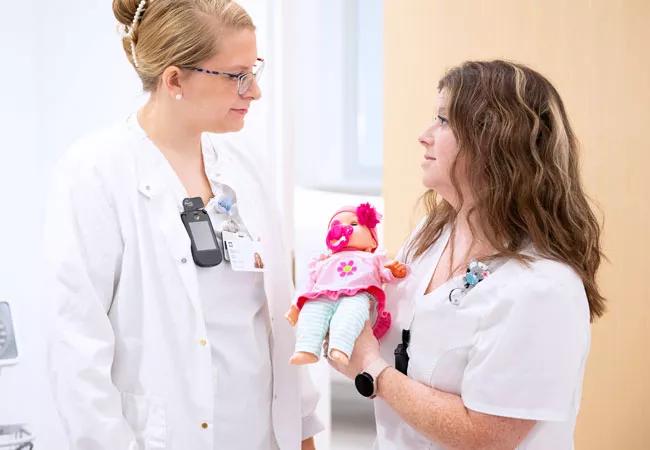Pilot study confirms feasibility of conducting additional research on the novel treatment

Healthcare facilities that manage patients with dementia or Alzheimer’s disease have reported success in reducing confusion and agitation when using baby dolls or toy dogs and cats. Despite ample anecdotal evidence to support the value of tactile nonpharmacologic interventions, acute-care researchers had not previously explored the feasibility of conducting formal studies to understand the efficacy of baby doll therapy (BDT).
Advertisement
Cleveland Clinic is a non-profit academic medical center. Advertising on our site helps support our mission. We do not endorse non-Cleveland Clinic products or services. Policy
A team of Cleveland Clinic nurse investigators addressed this knowledge gap with a pilot study aimed at evaluating the viability of further BDT research. Led by assistant nurse managers Ashley Hall, MSN, RN, and Elizabeth Cai, MSN, RN, CMSRN, the research team not only found BDT worthy of future study, but also confirmed that the therapy itself may provide benefit to patients with dementia.
“Randomized controlled trials can be quite costly, resource intensive and time-consuming, so it was important to test the feasibility of providing baby dolls to patients with cognitive impairment,” says Hall. “We wanted to learn if a larger study could be completed from a logistical standpoint, and we hoped our research would illuminate how patients might respond to their dolls.”
Prior to starting the therapy, all clinical nurses who worked on the two Cleveland Clinic study units were required to attend specialized training on how to use and interpret the agitated behavior scale (ABS). Cai says the training was designed to reduce nurse-to-nurse scoring variations and improve the fidelity of data collection.
The study included 12 hospitalized men and 34 women aged 70 to 96 years with dementia. Subjects were initially evaluated using the ABS; those who scored a 3 or more were issued a doll provided by a grant from the Medina Hospital Foundation.
Hall explains that the feasibility of future research on BDT hinged on answers to several key questions, including whether the dolls would be well received by both male and female patients and their families. “The answer to our primary question was overwhelmingly yes!” she says. “Almost without exception, patients received the dolls with open arms. It was actually quite astonishing to watch how they interacted with their ‘babies.’”
Advertisement
Cai adds that many of the dolls — soft-bodied with blinking eyes — were named by their patient ‘guardians.’ “We were introduced to Violet, Josephine, Daisy and even Sweet Baby Jesus,” she says.
Some patients held or slept with their doll; the bedside table was even used as a crib by one patient and a “baby bouncer” by another, Cai explains. In some cases, the baby doll was forgotten by the patient and had to be reintroduced several times.
Although each patient (study participant) approached their “caregiving responsibilities” differently, interactions with the doll seemed to correspond to a reduction in agitation, says Hall. “Although evaluating the effectiveness of BDT was not our original objective, we found that ABS scores decreased among patients who received a doll,” she adds. “Both caregivers and family members expressed witnessing notable changes in patient demeanor, and we were amazed by the positive
feedback we received.”
Ultimately, the pilot study demonstrates that BDT appears to be associated with a reduction in agitation behaviors. However, investigators caution that more research is needed.
“It took us a long time to get from developing a hypothesis to receiving pilot study outcomes, but our findings are encouraging, and we are excited to consider next steps,” says Hall. “We were hopeful that patients would respond positively to the dolls, but we were not expecting the nursing staff to be as engaged in and excited about the therapy as they were. We’re still fielding requests for more dolls!”
Advertisement
Cai adds, “Caring for a doll can put structure and sense of responsibility back into the lives of
patients with dementia and provide them with comfort.”
Advertisement
Advertisement

Depression, agitation, delusions and more compound challenges for patients and caregivers

Patient’s favorite food helps guide decisions regarding end-of-life interventions

Patients benefit when doctors disclose with care

New findings have important implications for clinical trial design

How wellness habits help nurses flourish

An expert talks through the benefits, limits and unresolved questions of an evolving technology

Researchers explore the mental and physical benefits of social prescribing

Planning continues with critical, patient-focused input from nursing teams